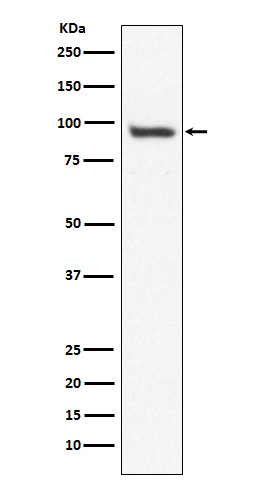Anti-USP13 Monoclonal Antibody
- SPECIFICATION
- CITATIONS
- PROTOCOLS
- BACKGROUND

Application
| WB, IF, ICC, IP, FC |
|---|---|
| Primary Accession | Q92995 |
| Host | Rabbit |
| Isotype | Rabbit IgG |
| Reactivity | Human, Mouse |
| Clonality | Monoclonal |
| Format | Liquid |
| Description | Anti-USP13 Monoclonal Antibody . Tested in WB, ICC/IF, IP, Flow Cytometry applications. This antibody reacts with Human, Mouse. |
| Gene ID | 8975 |
|---|---|
| Other Names | Ubiquitin carboxyl-terminal hydrolase 13, 3.4.19.12, Deubiquitinating enzyme 13, Isopeptidase T-3, ISOT-3, Ubiquitin thioesterase 13, Ubiquitin-specific-processing protease 13, USP13, ISOT3 |
| Calculated MW | 97327 Da |
| Application Details | WB 1:500-1:2000 ICC/IF 1:50-1:200 IP 1:50 FC 1:100 |
| Contents | Rabbit IgG in phosphate buffered saline, pH 7.4, 150mM NaCl, 0.02% sodium azide and 50% glycerol, 0.4-0.5mg/ml BSA. |
| Clone Names | Clone: ADDG-21 |
| Immunogen | A synthesized peptide derived from human USP13 Mediates deubiquitination of BECN1, a key regulator of autophagy, leading to stabilize the PIK3C3/VPS34-containing complexes. Also deubiquitinates USP10, an essential regulator of p53/TP53 stability. |
| Purification | Affinity-chromatography |
| Storage | Store at -20°C for one year. For short term storage and frequent use, store at 4°C for up to one month. Avoid repeated freeze-thaw cycles. |
| Name | USP13 |
|---|---|
| Synonyms | ISOT3 |
| Function | Deubiquitinase that mediates deubiquitination of target proteins such as BECN1, MITF, SKP2 and USP10 and is involved in various processes such as autophagy, endoplasmic reticulum-associated degradation (ERAD), cell cycle progression or DNA damage response (PubMed:21571647, PubMed:32772043, PubMed:33592542). Component of a regulatory loop that controls autophagy and p53/TP53 levels: mediates deubiquitination of BECN1, a key regulator of autophagy, leading to stabilize the PIK3C3/VPS34-containing complexes. Alternatively, forms with NEDD4 a deubiquitination complex, which subsequently stabilizes VPS34 to promote autophagy (PubMed:32101753). Also deubiquitinates USP10, an essential regulator of p53/TP53 stability. In turn, PIK3C3/VPS34-containing complexes regulate USP13 stability, suggesting the existence of a regulatory system by which PIK3C3/VPS34-containing complexes regulate p53/TP53 protein levels via USP10 and USP13. Recruited by nuclear UFD1 and mediates deubiquitination of SKP2, thereby regulating endoplasmic reticulum-associated degradation (ERAD). Also regulates ERAD through the deubiquitination of UBL4A a component of the BAG6/BAT3 complex. Mediates stabilization of SIAH2 independently of deubiquitinase activity: binds ubiquitinated SIAH2 and acts by impairing SIAH2 autoubiquitination. Regulates the cell cycle progression by stabilizing cell cycle proteins such as SKP2 and AURKB (PubMed:32772043). In addition, plays an important role in maintaining genomic stability and in DNA replication checkpoint activation via regulation of RAP80 and TOPBP1 (PubMed:33592542). Deubiquitinates the multifunctional protein HMGB1 and subsequently drives its nucleocytoplasmic localization and its secretion (PubMed:36585612). Positively regulates type I and type II interferon signalings by deubiquitinating STAT1 but negatively regulates antiviral response by deubiquitinating STING1 (PubMed:23940278, PubMed:28534493). |
| Cellular Location | Cytoplasm. |
| Tissue Location | Highly expressed in ovary and testes. |

Thousands of laboratories across the world have published research that depended on the performance of antibodies from Abcepta to advance their research. Check out links to articles that cite our products in major peer-reviewed journals, organized by research category.
info@abcepta.com, and receive a free "I Love Antibodies" mug.
Provided below are standard protocols that you may find useful for product applications.
If you have used an Abcepta product and would like to share how it has performed, please click on the "Submit Review" button and provide the requested information. Our staff will examine and post your review and contact you if needed.
If you have any additional inquiries please email technical services at tech@abcepta.com.













 Foundational characteristics of cancer include proliferation, angiogenesis, migration, evasion of apoptosis, and cellular immortality. Find key markers for these cellular processes and antibodies to detect them.
Foundational characteristics of cancer include proliferation, angiogenesis, migration, evasion of apoptosis, and cellular immortality. Find key markers for these cellular processes and antibodies to detect them. The SUMOplot™ Analysis Program predicts and scores sumoylation sites in your protein. SUMOylation is a post-translational modification involved in various cellular processes, such as nuclear-cytosolic transport, transcriptional regulation, apoptosis, protein stability, response to stress, and progression through the cell cycle.
The SUMOplot™ Analysis Program predicts and scores sumoylation sites in your protein. SUMOylation is a post-translational modification involved in various cellular processes, such as nuclear-cytosolic transport, transcriptional regulation, apoptosis, protein stability, response to stress, and progression through the cell cycle. The Autophagy Receptor Motif Plotter predicts and scores autophagy receptor binding sites in your protein. Identifying proteins connected to this pathway is critical to understanding the role of autophagy in physiological as well as pathological processes such as development, differentiation, neurodegenerative diseases, stress, infection, and cancer.
The Autophagy Receptor Motif Plotter predicts and scores autophagy receptor binding sites in your protein. Identifying proteins connected to this pathway is critical to understanding the role of autophagy in physiological as well as pathological processes such as development, differentiation, neurodegenerative diseases, stress, infection, and cancer.


